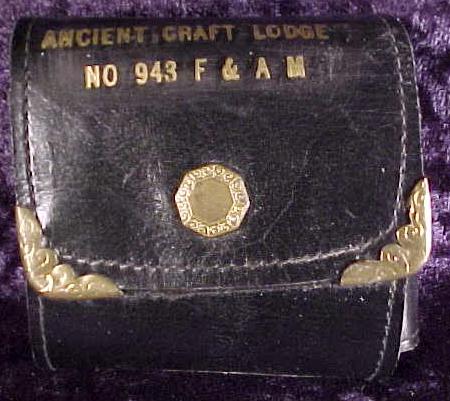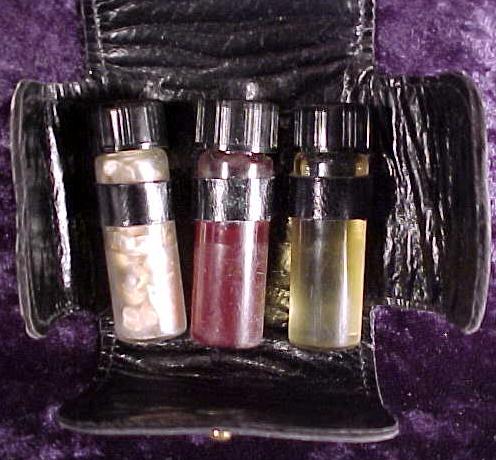|
Portable Masonic
Wages
of Corn, Wine and Oil


This portable leather case of corn, wine and oil
is symbolic of the wages paid to a Fellow Craft Mason as he makes his way or
"passes" through the middle chamber. The "corn, wine, and oil
are emblematical of nourishment, refreshment and joy and teach us this important lesson...
that we should be ever-ready to nourish the needy, refresh the destitute, and pour the oil
of joy in the hearts of the afflicted."
The corn in the Masonic rituals is
a synonym of grain or wheat. In
ancient rituals was used as an emblem of the Greek goddess
Demeter, or of the Roman Cybelis. Both female figures were conceived
as appearances of the Mother Earth. In Greek pottery someone can
see that in festivities in honour of Demeter the priests and the
faithful were crowned with ears of wheat. This symbolized the
fertility of the earth, which with the grain gives the bread to
the mankind. Thus was corn or grain according to this symbolism the
personification of the idea of plenty, abundance, and due to the
divine intervention promised fertility.
Following the same religious beliefs was wine the symbol of Greek
God Dionysos. By drinking the wine the Dionysiac priests and
initiated participants to the Bacchical mysteries were able to come
to the psychic condition of "methexis" - a condition of holy
madness -, so they could play the drama of ritual death and rebirth
of Dionysos. The wine helped them to loose their identity and come
as divine actors to a psychological situation, under which they
understood hidden truths and the divine allegory by using their
feelings and insights rather than their intellect. The wine was seen
as a symbol of joy, exaltation ,and as a mean towards the initiation
through the emotion and the instinct, by acting in Bacchical
rituals, after having eliminated the logic.
The oil was, as an extract of the olive fruit, a reward of the
Greek goddess of knowledge Athena - Pallas, who had as emblem, among
others, the olive-tree. One of the principal uses of oil was to
bring the light in homes, so it was seen in its more esoterical
significance as a symbol of spiritual Enlightenment, in other words as a
symbol of the eternal lantern of divine knowledge. In the same
meaning was the oil a symbol of peace through Enlightenment. Plants of
the olive tree were given as a reward to the winners of the Olympic
games, during which every war must be breached. Thus Athena brought to
the faithful with the present of oil the reward of hidden knowledge,
enlightenment and peace.
In the Biblical symbolism the three products possessed a similar
meaning and significance to this of the Greco-roman world. King
Solomon gave corn, wine and oil to the builders of the Temple as a
reward for their labors. The ear of corn together with the flood of
water personifies in the Hebrew word Shibboleth the abundance and
wealth. The wine was seen as an element of consecration and a
divine refreshment. The Hebrews anointed their Kings, Prophets and
High Priests with oil mixed with other spices, because the oil was the
major element of the ceremony, which was leading towards the path of
the divine initiation.
In the Christian symbolism the corn refers to the bread and this
last one makes someone remember of the body of Jesus Christ in the
Eucharist, as well as the wine refers to the blood of him. The oil
symbolizes the Baptism. The three substances are the most
significant of the Christian initiation. In Christian Masonic
degrees these three rewards of the Mason bring with them the
remembrance of the Holy Passion and the promise of the Resurrection.
According to all above mentioned symbolical languages the Mason
receives as a reward for his labors in the Lodge the present of
grain, because he fertilized himself and all other Masons by
working in the building of himself and the building of the Temple. He
receives the wine to remember that through his emotion and instinct
conquered the hidden knowledge by playing in the rituals the passions
of God his symbolical murder and his eternal rebirth. Thirdly he
receives the oil to remember that he achieved at the end of the road
the spiritual enlightenment, the baptism, and his inner peace as a
reflection of the eternal peace of God.

|
